People will have robots in their homes.
八上英语第七单元对话
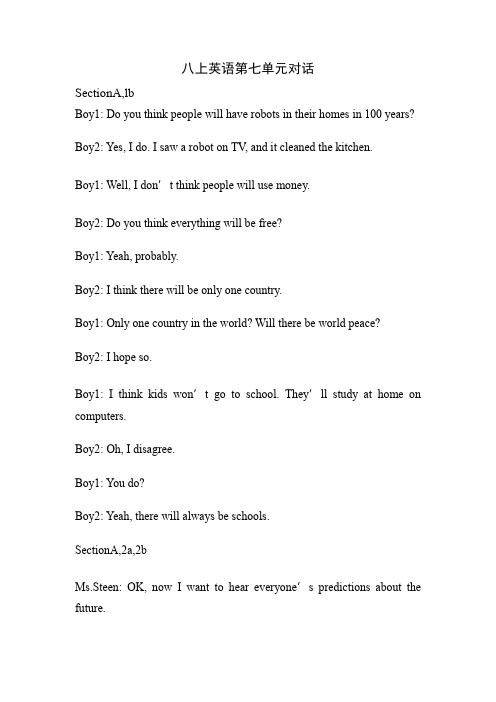
八上英语第七单元对话SectionA,lbBoy1: Do you think people will have robots in their homes in 100 years?Boy2: Yes, I do. I saw a robot on TV, and it cleaned the kitchen.Boy1: Well, I don’t think people will use money.Boy2: Do you think everything will be free?Boy1: Yeah, probably.Boy2: I think there will be only one country.Boy1: Only one country in the world? Will there be world peace?Boy2: I hope so.Boy1: I think kids won’t go to school. They’ll study at home on computers.Boy2: Oh, I disagree.Boy1: You do?Boy2: Yeah, there will always be schools.SectionA,2a,2bMs.Steen: OK, now I want to hear everyone’s predictions about the future.Girl1: Well, I think there will be more people.Ms.Steen: More people? OK. What else?Boy1: I think that there will be less free time.Ms.Steen: I hope not!Girl2: Well, I think there will be fewer cars.Ms.Steen: You do?Girl2: Yes, people will use the subways more.Ms.Steen: That’s agreat idea. Let's hear another prediction.Boy2: There will be less pollution.Ms.Steen:That will be good for the earth!Girl1: I think there will be fewertrees.And cities will be really big and crowded because there will be a lot more people.SectionB,lc,IdConversation1Alexis: Hi, I’m Alexis.Joe: Nice to meet you,Alexis. I’m Joe.Alexis: Nice to meet you, Joe. Do you live here in Highville?Joe: Yes, I do. I live in an apartment across the street from here. Alexis: Oh, really?Joe: Yes. I work near here, too. I’m a computer programmer.Alexis: A computer programmer? That sounds interesting.Joe: Well, actually it’s kind of boring. I do the same thing every day. Conversation2Alexis: Hey, Joe, is that a picture of you?Joe: Yeah, that was me 10 years ago.Alexis: So, did you live here in Highville 10 years ago?Joe: No, I lived with my parents in Greenville. We lived in a house in the country. I went to school here in Highville, though.Alexis: Really? That’s pretty far from here. How did you get to school?Joe: Oh, I took the train to school.Conversation3Alexis: So, Joe, what do you think your life will be like in 10 years?Joe: Oh, I think I’ll be an astronaut.Alexis: An astronaut? Are you kidding?Joe: No, I’m serious. I’ll fly rockets to the moon. Maybe I’ll also fly to other planets.Alexis: Oh, and where will you live?Joe: I’ll live on a space station.。
People will have robots in their homes
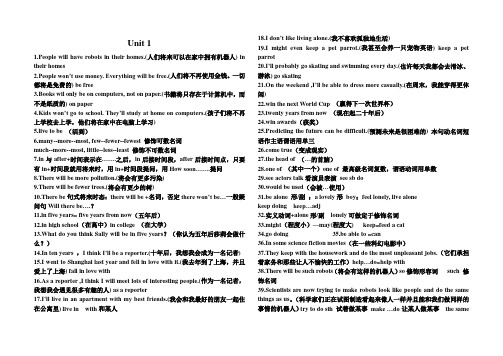
Unit 11.People will have robots in their homes.(人们将来可以在家中拥有机器人) in their homes2.People won’t use money. Everything will be free.(人们将不再使用金钱。
一切都将是免费的) be free3.Books wil only be on computers, not on paper.(书籍将只存在于计算机中,而不是纸质的) on paper4.Kids won’t go to school. They’ll study at home on computers.(孩子们将不再上学校去上学,他们将在家中在电脑上学习)5.live to be (活到)6.many--more--most, few--fewer--fewest 修饰可数名词much--more--most, little--less--least 修饰不可数名词7.in与after+时间表示在…….之后,in后接时间段,after后接时间点,只要有in+时间段就用将来时,用in+时间段提问,用How soon…….提问8.There will be more pollution.(将会有更多污染)9.There will be fewer trees.(将会有更少的树)10.There b e句式将来时态:there will be +名词,否定there won’t be…一般疑问句Will there be….?11.in five years= five years from now(五年后)12.in high school(在高中)in college (在大学)13.What do you think Sally will be in five years?(你认为五年后莎莉会做什么?)14.In ten years ,I think I’ll be a reporter.(十年后,我想我会成为一名记者)15.I went to Shanghai last year and fell in love with it.(我去年到了上海,并且爱上了上海) fall in love with16.As a reporter ,I think I will meet lots of interesting people.(作为一名记者,我想我会遇见很多有趣的人) as a reporter17.I’ll live in an apartment with my best friends.(我会和我最好的朋友一起住在公寓里) live in with和某人18.I don’t like living alone.(我不喜欢孤独地生活)19.I might even keep a pet parrot.(我甚至会养一只宠物英语) keep a pet parrot20.I’l l probably go skating and swimming every day.(也许每天我都会去滑冰、游泳) go skating21.On the weekend ,I’ll be able to dress more casually.(在周末,我能穿得更休闲)22.win the next World Cup (赢得下一次世界杯)23.twenty years from now (现在起二十年后)24.win awards(获奖)25.Predicting the future can be difficult.(预测未来是很困难的) 本句动名词短语作主语谓语用单三e true(变成现实)27.the head of (…的首脑)28.one of (其中一个)one of 最高级名词复数,谓语动词用单数29.see actors talk看演员表演see sb do30.would be used(会被…使用)31.be alone 形/副;a lovely形boy;feel lonely, live alonekeep doing keep…adj32.实义动词+alone形/副lonely可做定于修饰名词33.might(程度小)—may(程度大) keep=feed a cat34.go doing 35.be able to =can36.In some science fiction movies(在一些科幻电影中)37.They keep with the housework and do the most unpleasant jobs.(它们承担着家务和那些让人不愉快的工作)help…d o=help with38.There will be such robots(将会有这样的机器人)so修饰形容词such 修饰名词39.Scientists are now trying to make robots look like people and do the same things as us。
新目标英语八年级下unit1-will-people-have-robots

2. I ____________(go) to see your father as soon as I get to Beijing.
3. I think it _____________ (be) rainy tomorrow.
4. My father ___________ (send) me a new bike when I am tall enough.
5. We ___________ (visit) the Great Wall next Monday.
6. Who __________(give) us a talk on the computer in two days?
7. They _________ (build) a new modern house near the river next year.
(A D A C D C)
7. A bird can ______ but I can’t. A. flies B. flying C. flew D. fly
8. They _______ to see me yesterday evening. A. will come B. comes C. are coming D. came
Activity 3a
Do this part following the structure.
A task
Get the students to do a survey about their best friends and finish the following chart.
公开课获奖《U7 Will people have robots练习课件

this evening. 4. They _w_i_l_l _p_l_a_y_(play) soccer if it doesn’t rain. 5. We _w_i_ll__h_a_v_e_ (have) a meeting tomorrow.
1.人们将在家里有机器人. People will have robots in their homes. 2.琳达认为20年后人们将会很忙. Linda thinks people will be busy in 20 years.
3.你认为孩子们将会去上学吗? Do you think kids will go to school?
Ⅱ. 翻译句子
1. 你认为人们的家里会有机器人吗? Do __y_o_u__ _t_h_i_n_k_ there will be robots __i_n__ __p_e_o_p_l_e_’s___ homes?
2. 人们将活到150岁。 People __w__il_l _ __li_v_e_ __t_o__ __b_e__150 years old.
4. How many people___D__ there fifty years ago.
A. will B. were C. are D. will be
5. In AD 20 000,what___B____the world be like?
A. is B. will
C. was D. are
5. __I_t _s_ee_m__s___ (好似) they have known our new address.
人教版英语八年级上册unit7测试题
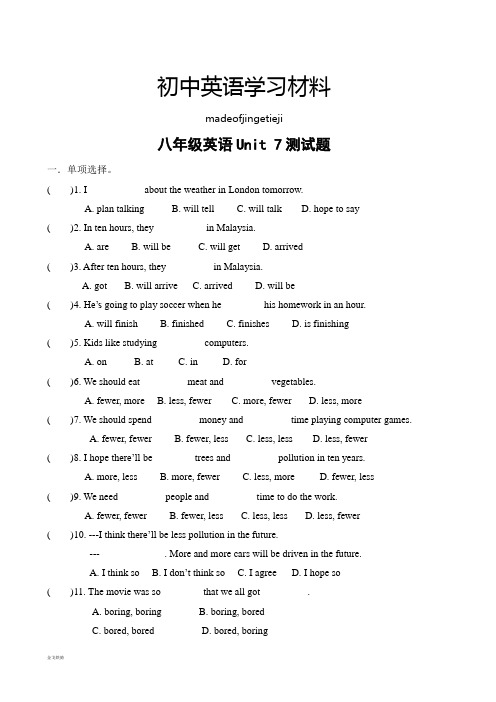
初中英语学习材料madeofjingetieji八年级英语Unit 7测试题一.单项选择。
( )1. I ___________about the weather in London tomorrow.A. plan talkingB. will tellC. will talkD. hope to say( )2. In ten hours, they __________in Malaysia.A. areB. will beC. will getD. arrived( )3. After ten hours, they _________in Malaysia.A. gotB. will arriveC. arrivedD. will be( )4. He’s going to play soccer when he ________his homework in an hour.A. will finishB. finishedC. finishesD. is finishing( )5. Kids like studying _________computers.A. onB. atC. inD. for( )6. We should eat _________meat and _________vegetables.A. fewer, moreB. less, fewerC. more, fewerD. less, more( )7. We should spend _________money and _________time playing computer games.A. fewer, fewerB. fewer, lessC. less, lessD. less, fewer( )8. I hope there’ll be ________trees and _________pollution in ten years.A. more, lessB. more, fewerC. less, moreD. fewer, less( )9. We need _________people and _________time to do the work.A. fewer, fewerB. fewer, lessC. less, lessD. less, fewer( )10. ---I think there’ll be less pollution in the future.---_____________. More and more cars will be driven in the future.A. I think soB. I don’t think soC. I agreeD. I hope so( )11. The movie was so ________that we all got _________.A. boring, boringB. boring, boredC. bored, boredD. bored, boring( )12. ---The water in the river is ______.---Yes, water ____is getting more and more serious.A. polluted, pollutedB. pollution, pollutionC. pollution, pollutedD. polluted, pollution( )13. Her homework usually _________two hours.A. takesB. spendsC. paysD. costs( )14. I think it is __________for us to walk on the moon one day.A. possibleB. possiblyC. maybeD. probably( )15. We need to play a part in __________our country more beautiful.A. makeB. makesC. to makeD. making( )16. Trees are __________. We must do something to stop that.A. dangerousB. in dangerousC. dangerD. in danger( )17. ________a reporter, I will meet many interesting people.( )18. Some scientists are trying to make robots _________like humans.A. thinkB. thoughtC. thinkingD. to think( )19. __________the students in our school walk to school every day.A. Nine hundredB. Nine hundredsC. Hundred ofD. Hundreds of( )20. Could you please tell me ____________?A. what will the future likeB. what the future will be likeC. how do you think of the movieD. how you think of the TV play二、完形填空。
一般将来时的复习

将来孩子们在家用微机学习 将来孩子们在家用微机学习. 孩子们在家用微机学习
won’t study Kids will study at home on computers in the future.
人们将活到200岁. 岁 人们将活到
People will live to be 200 years old .
一般将来时
一般将来时表示将来发生的动作或情况
结构: 结构:will / shall + 动词原形 肯定句:主语 肯定句:主语+ will / shall +动词原形 动词原形 标志词: 标志词: tomorrow , next…in five years/,this evening… People will have robots in their homes. There will be a football match tomorrow. Kids will study at home on computers.
否定句: 的后面加not即可。 即可。 否定句:在will / shall 的后面加 即可 will not = won’t People will not (won’t) have robots in their homes.
Kids won’t go to school next week.
般疑问句: 提到句子主语之前, 一般疑问句:把will / shall 提到句子主语之前, 结尾变问号 Will people have robots in their homes? Will there will be fewer trees in the future? Will you fly to Paris next week?
初中英语 人教版八年级下册期末总复习(讲练+习题含答案,共104张PPT)

3. I think there will be more / less pollution. 我认为将会有更多/更少的污染。
fewer与less及more表数量的用法。
(3)many“许多”,修饰可数名词。 much“许多”,修饰不可数名词。
many / much比较级、最高级为不规则变化:many / much-more-most
“a few”表示“一些”+可数名词
例:a few days ago, for a few weeks, He has few friends here. There will be fewer trees.
3. I think there will be more / less pollution. 我认为将会有更多/更少的污染。
He went home after two days. 他两天后回家了。 Three years later,she had a baby. 三年后,她生了一个婴儿。
fall in love with 爱上… fall in love with a girl 爱上一个女孩 fall in love with a country 爱上一个国家
例:I have many magazines. She has more magazines. But he has the most. There will be more people on the earth in future. More and more students start to exercise more every day to keep fit.
典例展示 2.About Pollution
Tina: There is much pollution around us.
人教版英语八年级上册Unit7全单元 重点知识复习总结
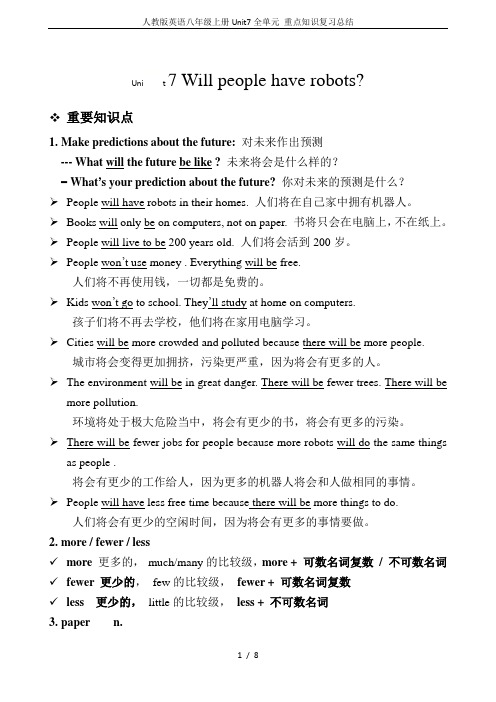
Uni t 7 Will people have robots?❖重要知识点1.Make predictions about the future: 对未来作出预测--- What will the future be like ? 未来将会是什么样的?= What’s your prediction about the future? 你对未来的预测是什么?➢People will have robots in their homes. 人们将在自己家中拥有机器人。
➢Books will only be on computers, not on paper. 书将只会在电脑上,不在纸上。
➢People will live to be 200 years old. 人们将会活到200岁。
➢People won’t use money . Everything will be free.人们将不再使用钱,一切都是免费的。
➢Kids won’t go to school. They’ll study at home on computers.孩子们将不再去学校,他们将在家用电脑学习。
➢Cities will be more crowded and polluted because there will be more people.城市将会变得更加拥挤,污染更严重,因为将会有更多的人。
➢The environment will be in great danger. There will be fewer trees. There will be more pollution.环境将处于极大危险当中,将会有更少的书,将会有更多的污染。
➢There will be fewer jobs for people because more robots will do the same things as people .将会有更少的工作给人,因为更多的机器人将会和人做相同的事情。
新目标英语八年级下册Unit1 Will people have robots?讲解与练习
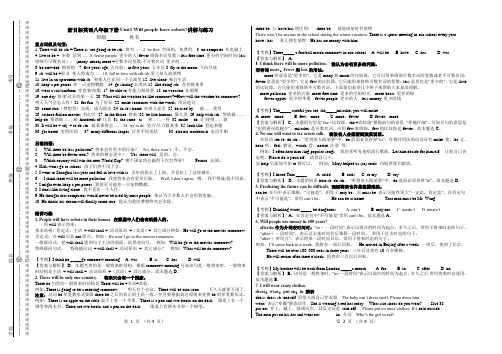
第 1 页 (共4 页) 第 2 页 (共4 页)学校 姓名 班级 考场 考号---------------------------------○密------------------ -------------------○封----------------------------- -- --○线----------------------------※※※※※※※※※※※※※※※答※※※※※※※※※※※※※※※※※※题※※※※※※※※※※※※※※※※线※※※※※※※※※※※※※新目标英语八年级下册Unit1 Will people have robots?讲解与练习班级 姓名重点词组及句型:1. There will be sth.= There is /are going to be sth. 将有……2. be free 空闲的,免费的3. on computer 在电脑上4. live to be + 岁数 活到……5. fewer people 更少的人(fewer 修饰名词复数);less free time 更少的空闲时间(less修饰不可数名词); (many /much) more +可数名词复数/不可数名词 更多的……6. be crowded 拥挤的7. five years ago 五年前;in five years 五年后8. fly to the moon 飞向月球9. sb. will be +职业 某人将成为……10. fall in love with sth./sb.爱上某人或某物11. live in an apartment with sb. 和某人住在同一个公寓里12. live alone 独自生活13. keep a pet parrot 养一只宠物鹦鹉 14. go skating 去滑冰15. like doing sth. 喜欢做某事16. wear a suit\uniform 穿套装\制服 17. be able to 有能力做某事 18. on vacation 在假期19. one day 将来\过去的某一天 20. What will the weather be like tomorrow?=How will the weather be tomorrow?明天天气会怎么样?21. for fun 为了好玩 22. make sentences with the words 用词造句23. come true (梦想等)实现;成为现实 24. in sb's home 在某人家里 25. be used by 被……使用26. science fiction movies 科幻片 27. in the future 将来 28. be like humans 像人类 29. help with sth. 帮助做……help do 帮助做…… 30. hundreds of 几百 31. the same...as... 和……一样 32. make ... do 让\使得……做33. It will be + adj. + to do sth. 做某事将会…… 34. try to do 努力\尽力做某事 35. look like 看起来像36. get bored 变得厌烦 37. many different shapes 许多不同形状 38. electric toothbrush 电动牙刷日常用语:1. ---Will there be less pollution? 将来会有更少的污染?---No, there won’t. 不,不会。
中小学英语教材教法试题及答案
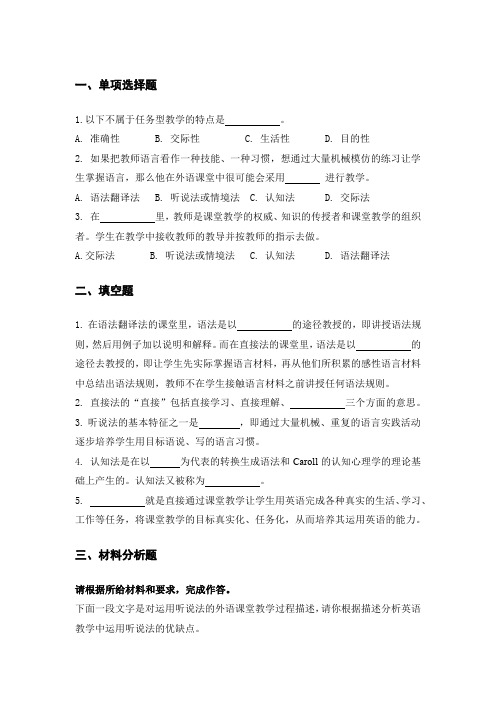
一、单项选择题1.以下不属于任务型教学的特点是。
A. 准确性B. 交际性C. 生活性D. 目的性2. 如果把教师语言看作一种技能、一种习惯,想通过大量机械模仿的练习让学生掌握语言,那么他在外语课堂中很可能会采用进行教学。
A. 语法翻译法B. 听说法或情境法C. 认知法D. 交际法3. 在里,教师是课堂教学的权威、知识的传授者和课堂教学的组织者。
学生在教学中接收教师的教导并按教师的指示去做。
A.交际法B. 听说法或情境法C. 认知法D. 语法翻译法二、填空题1.在语法翻译法的课堂里,语法是以的途径教授的,即讲授语法规则,然后用例子加以说明和解释。
而在直接法的课堂里,语法是以的途径去教授的,即让学生先实际掌握语言材料,再从他们所积累的感性语言材料中总结出语法规则,教师不在学生接触语言材料之前讲授任何语法规则。
2. 直接法的“直接”包括直接学习、直接理解、三个方面的意思。
3.听说法的基本特征之一是,即通过大量机械、重复的语言实践活动逐步培养学生用目标语说、写的语言习惯。
4. 认知法是在以为代表的转换生成语法和Caroll的认知心理学的理论基础上产生的。
认知法又被称为。
5. 就是直接通过课堂教学让学生用英语完成各种真实的生活、学习、工作等任务,将课堂教学的目标真实化、任务化,从而培养其运用英语的能力。
三、材料分析题请根据所给材料和要求,完成作答。
下面一段文字是对运用听说法的外语课堂教学过程描述,请你根据描述分析英语教学中运用听说法的优缺点。
材料使用听说法的教学过程一般分为五个步骤。
首先认识,即教师口说句型,借助实物、图片、模型、手势、上下文、情景等直观手段释义,学生听音会意。
接着模仿,即教师反复示范,学生跟着反复模仿,发现错误,教师及时纠正。
第三步是重复,即在模仿的基础上,学生反复操练,直到巩固、记住为止。
接着变换,即在记住所有语言材料上,进行句型替换、转换或拓展的练习,培养学生初步运用语言的能力。
最后一步是选择,即让学生在学过的语言中选择某些词汇、成语和句型,用于实际生活环境,培养学生灵活应用所学语言材料表达自己思想的能力。
英语八年级上册Unit7Willpeoplehaverobots[A(1A-2D)]
![英语八年级上册Unit7Willpeoplehaverobots[A(1A-2D)]](https://img.taocdn.com/s3/m/822aeb386ad97f192279168884868762caaebb16.png)
Robots? Sounds interesting. Will people have robots in their homes in 50 years?
Yes, they will.
Will kids go to school then?
No, they won’t. They will study at home. And books will not be on paper.
Lyoisuteh2nebaagr.ain. Check (√) the predictions
____ 1. There will be fewer people. ____ 2. There will be less free time. ____ 3. People will use the subways less. ____ 4. There will be more pollution. ____ 5. Cities will be very big and crowded.
computers. 5. There will be only one country. 6. People will live to be 200 years old.
Listen again and fill in the blanks.
A: Do you _t_h_in_k_ people will _h_a_v_e_r_o_b_o_t_s in their homes __i_n_ __1_0_0_ __y_e_a_r_s__?
What do you want to be when you grow up? I want to be a scientist.
How are you going to do that?
初中英语备课参考 Will People Have Robots

Unit 1 Will People Have RobotsSection A1. People will have robots in their homes. 人们家里将会有机器人。
will助动词,表单纯的未来。
用于陈述句表“将……,会……”。
e.g. I will (I'll) be 15 next month.下个月我就15岁了。
Mr. Green will be back soon.He won't be back before 10.否定句:won't = will notwill用于疑问句意为“会……吗?”e.g. Will you be free on Friday evening?Will people have robots?2. There will only be one country.将会只有一个国家。
There will be 是there be句型的将来时态。
e.g. There won't be any paper money. (否定)Will there be less pollution? (疑问)Yes, there will./ No, there won't.There will be more people. (肯定)※常见错误:there will have…3. In some science fiction movies,people in the future have their own robots.These robots are just like humans,They help with the housework, and do the most unpleasant jobs.在一些科幻影片中,未来的人们有他们自的机器人.这些机器人正像人类一样。
他们帮助人类做家务,做些人类最不想干的工作。
新目标英语八年级下unit1-will-people-have-robots
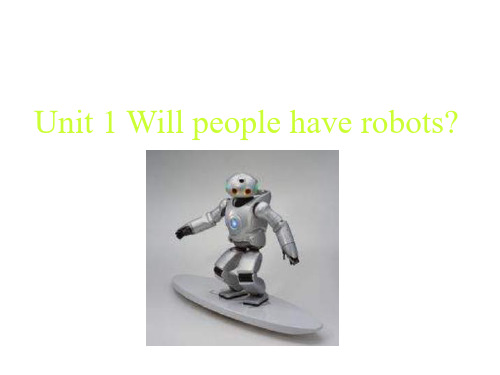
1. People will have robots in their homes. 2. People won’t use money. Everything will be free. 3. Books will only be on computers, not on paper. 4. Kids won’t go to school. They’ll study at home on
(DDCBBC)
5. Mary usually _______ up at five o’clock. A. will get B. got C. get D. gets
6. They ______ four English classes a week last term. A. has B. have C. had D. are having
I. Fill in the blanks with the right form of the given verbs.
1. What _________ you ______(do) this Sunday? There _____________(be) a football match. ______you _________(go) with us?
computers. 5. There will only be one country. 6. People will live to be 200 years old.
Pairwork
Change the predictions into questions and ask each other these questions.
人教版英语八年级上册unit7willpeoplehaverobots?检测题含详解
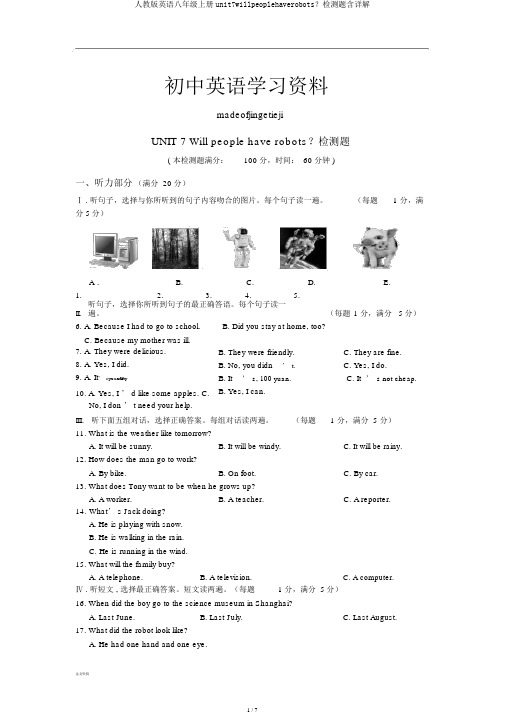
初中英语学习资料madeofjingetiejiUNIT 7Will people have robots?检测题( 本检测题满分:100 分,时间: 60 分钟 )一、听力部分(满分 20 分)Ⅰ . 听句子,选择与你所听到的句子内容吻合的图片。
每个句子读一遍。
(每题 1 分,满分 5分)A . B. C. D. E.1._______2. _______3. _______4. _______5. _______II.听句子,选择你所听到句子的最正确答语。
每个句子读一遍。
(每题1 分,满分 5 分)6.A. Because I had to go to school. B. Did you stay at home, too?C. Because my mother was ill.7.A. They were delicious.8.A. Yes, I did.9.A. It’ syuanfifty .10.A. Yes, I ’ d like some apples. C.No, I don ’ t need your help. B. They were friendly.B. No, you didn’ t.B. It’ s, 100 yuan.B. Yes, I can.C. They are fine.C. Yes, I do.C. It’ s not cheap.III.听下面五组对话,选择正确答案。
每组对话读两遍。
(每题 1 分,满分 5 分)11.What is the weather like tomorrow?A. It will be sunny.B. It will be windy.C. It will be rainy.12.How does the man go to work?A. By bike.B. On foot.C. By car.13.What does Tony want to be when he grows up?A. A worker.B. A teacher.C. A reporter.14.What’ s Jack doing?A.He is playing with snow.B.He is walking in the rain.C.He is running in the wind.15.What will the family buy?A. A telephone.B. A television.C. A computer.Ⅳ . 听短文 , 选择最正确答案。
2020-2021学年人教版八年级英语第一学期Unit7 Will people have robots单元检测题(含答案)
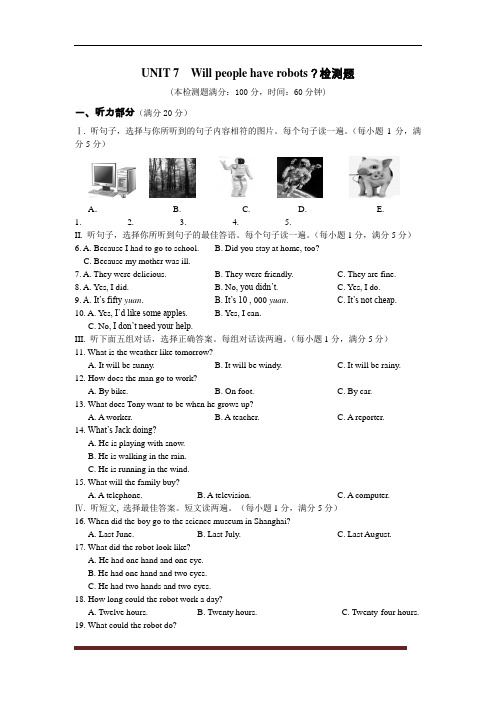
UNIT 7 Will people have robots?检测题(本检测题满分:100分,时间:60分钟)一、听力部分(满分20分)Ⅰ. 听句子,选择与你所听到的句子内容相符的图片。
每个句子读一遍。
(每小题1分,满分5分)A. B. C. D. E.1. _______2. _______3. _______4. _______5. _______II. 听句子,选择你所听到句子的最佳答语。
每个句子读一遍。
(每小题1分,满分5分)6. A. Because I had to go to school. B. Did you stay at home, too?C. Because my mother was ill.7. A. They were delicious. B. They were friendly. C. They are fine.8. A. Yes, I did. B. No, you didn’t. C. Yes, I do.9. A. It’s fifty yuan. B. It’s 10 , 000 yuan. C. It’s not cheap.10. A. Yes, I’d like some apples. B. Yes, I can.C. No, I don’t need your help.III. 听下面五组对话,选择正确答案。
每组对话读两遍。
(每小题1分,满分5分)11. What is the weather like tomorrow?A. It will be sunny.B. It will be windy.C. It will be rainy.12. How does the man go to work?A. By bike.B. On foot.C. By car.13. What does Tony want to be when he grows up?A. A worker.B. A teacher.C. A reporter.14. What’s Jack doing?A. He is playing with snow.B. He is walking in the rain.C. He is running in the wind.15. What will the family buy?A. A telephone.B. A television.C. A computer.Ⅳ. 听短文, 选择最佳答案。
英语八年级上册Unit7

I agree
predictions I disagree
1.People will have robots in their homes.
2.People won’t use money. Everything will be free.
computers. 5. There will only be one country. 6. People will live to be 200 years old.1
A: Will people use money in 100 years?
B: Yes, they will. / No, they won’t.
one country
There will only be one country. Will there only be one country? Yes , there will./ No, there won’t.
200 years old
People will live to be 200 years old. 活到
Unit 7 Will people have robots?
/wil/ 将会(情态动词)
Section A (1a-1c)
学习目标
•1.掌握单词:will, paper. •2.掌握情态动词will 表将来。 •3.会对未来的事情进行预测。
New words paper
[ˈpeipə] n. 纸;纸张
in 100 years
Do you love robots?
Will people have robots in their homes? Yes , they will. / No, they won’t. won’t = will not
Unit,7,Will,people,have,robots教案

Unit,7,Will,people,have,robots教案篇一:八年级上册unit7 will people have robotsUnit 7 will people have robots?一.教学目标: 1. 语言知识目标:1) 能掌握以下单词:paper prediction pollution2) 能掌握以下句型:① I will be a/an ??② Will you be a/an???Yes, I will.No, I won’t.③ Kids won’t go to school. They will study at home on computers.④People will have robots in their homes.3) 能了解以下语法:“will + 动词原形” 来表达一般将来时态,以及它的肯定、否定和一般疑问句形式。
2.能力目标:学会表达自己对未来的看法;学会谈论自己未来的打算。
3. 情感态度价值观目标:通过引导学生展望未来,及对未来生活的预测,让学生在潜移默化中反省自己的现状。
对未来的生活有一定的打算并为此付出相应的努力。
二.学生情况分析1、因为地处农村,学生的英语学习环境、学习风气、学习兴趣以及学习积极性都不尽相同,大部分学生学习积极性不够强,因此调动学生积极性很重要2、部分学生对于一般现在时、一般过去时和一般将来时的用法、不同时态谓语动词形式的构成等知识内容还未能全面理解和掌握,还需自己多练,也需教师加强辅导。
二、教学重难点1. 教学重点:理解并初步掌握一般将来时态的意义和结构。
2. 教学难点:情态动词will + 动词原形来表达一般将来时态。
三、教学过程Ⅰ.Review复习上个单元用be going to+动词原形表将来的方法由回答what are you going to be when you grow up?来复习相关的职业词汇,computer programmer, pianist, violinist, pilot, engineer, and so on. Ⅱ. Lead-in1.由一首歌whatever will be will be 作为导入引入由will构成将来时态。
- 1、下载文档前请自行甄别文档内容的完整性,平台不提供额外的编辑、内容补充、找答案等附加服务。
- 2、"仅部分预览"的文档,不可在线预览部分如存在完整性等问题,可反馈申请退款(可完整预览的文档不适用该条件!)。
- 3、如文档侵犯您的权益,请联系客服反馈,我们会尽快为您处理(人工客服工作时间:9:00-18:30)。
Listening
科目一考试 科目一模拟考试 仿真考试 最新试题
科目四考试 科目一模拟考试 仿真考试 最新试题
感冒时,特殊的机器会照看你的鼻子。
After 100 years, special devices will automatically take care of your runny nose when you are ill.
如果你要去其他国家,你可以自己开车去。
After 100 years, if you want to go to another country, you’ll be able to drive there.
四条腿的裤 子保证你随 时随地可以 休息。
After 100 years, the four-legged jeans will make sure you have a place to sit everywhere you go.
√ 5.Cities will be very big and crowded. ____
2c Make conversations about the predictions in 2a and 2b. A: What’s your prediction about the future?
B: I think there will be more pollution.
A: Really? I don’t think so. But I think there
will be fewer trees.
2d Role-play the conversation. Nick: What are you reading, Jill? Jill: It’s a book about the future. Nick: Sounds cool. So what will the future be like? Jill: Well, cities will be more crowded and polluted. There will be fewer trees and the
Newspapers predicted that Davis would be
re-elected. 报纸预测戴维斯将再次当选。
拓展:
Predictable adj
Predictably adv
可预测的
可预言地
Predictability n
可预言
5. Everyone should play a part in saving the
1b Listen and circle questions you hear in 1a. 1.People will have robots in their homes.
2. People won’t use money. Everything will be free.
3.Books will only be on computers, not on paper. 4. Kids won’t go to school. They’ll study at home on computers. 5.There will only be one country.
By the year 3000, you won’t carry a backpack. It will carry you.
By the year 3000, cars will always
have to stop for stop signs.
By the year 3000, your computer will punish you if you type something nasty(肮脏的) .
Books will only be on computers, not on paper.
A B. C default. 12 + =? ?。。。
Kids won’t go to school. They’ll study at home on computers.
There will only be one country. People will live to be 200 years old.
6.People will live to be 200 years old.
1c Ask and answer questions about the predictions in 1a.
A: Will people use money in 100 years? B: No, they won’t. everything will be free. Will people live to be 200 years old? A: Yes, they will.
fewer less
more more
fewest least
most most
词语对对碰
fewer vs less 相同点: 这两个词后都是比较级, 均可表示“较少的”。 不同点: 1. fewer是few的比较级,只能修饰可数名词的复数. 2. less是little的比较级,只能修饰不可数名词的复数. 试做以下试题: less money than my sister. ①I earn ______ fewer cars parked outside than yesterday. ②There are ______ fewer students this year than last year. ③We have ______ ④You ought to smoke ______ fewer cigarettes and less beer. drink _____
4. What’s your prediction about the future?
你对未来有什么预测?
prediction 是predict 的名词形式。有“预言、
预料、预测之意。 例如:
Sales were five percent flowerer than predicted.
销售额比预计的低5%。
2a Listen and circle the words you hear.
1.There will be(more / less / fewer)people.
2.There will be (more / less / fewer) free time.
3.There will be (more / less / fewer) cars. 4.There will be (more / less / fewer) pollution. 5.There will be (more / less / fewer) trees.
earth. 每个人都应当尽一份力来拯救地球。
2. Will people use money in 100 years? 一百年后人们还会使用钱吗? 这里的 in 100 years “在...期间;在...以后”后 接一段时间表示在将来某段时间之后。 e.g. He'll come back in a week. 他将于一周之后回来。 I’ll call you in two hours.
2b Listen again. Check ( √) the predictions you hear.
1.There will be fewer people.
2.There will be less free time.
_______ √
______ √ ______
3. People will use the subways less. ______ 4.There will be more pollution.
3. Books will only be on computers, not on paper. ____A ___D
4. Kids won’t go to school. They’ll study at home on computers. ____A ___D
5. There will only be one country. ____A ___D 6. People will live to be 200 years old. ____A ___D
我两个小时后给你打电话。
3. Everything will be free.
任何东西都是免费的。 还有“ 空闲的” 意思。
Hale Waihona Puke be free 在这里表示“免费的”。另外“ be free” e.g. Admission is free for children under 9.
九岁以下儿童免费入场。 I’ll be free next week. 我下周有空。
Language Goal:
Make predictions
1a How will the world be different 100 years from now? Read these predictions. Check ( √ ) A ( for agree) or D ( for disagree). 1. People will have robots in their homes. ____A ___D 2. People won’t use money. Everything will be free. ____A ___D
Jill: We can use less water and plant more trees.
Everyone should play a part in saving the
earth.
Language Points
1. People won’t use money. Everything will be free. 人们不使用钱,任何东西都是免费的。 be free 免费的, 除此意思外,be free 还 有“ 有空的,空闲的之意。 e.g. Many Spaniards believe that music and movies should be free. 许多西班牙人认为 音乐和电影应该是免费的。 Will you be free tomorrow morning? 你明天早上有空吗?
